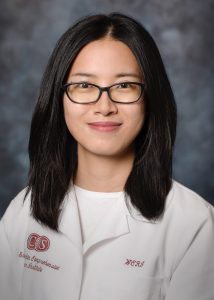2018 Mentored Investigator Grant Recipient — Ye Hu, MD, PhD
Project Summary
The proposed study addresses the urgent need for more effective immunotherapies. The recent success of immunotherapies targeting immune-checkpoint molecules have unequivocally demonstrated the essential role of the immune system in the eradication of tumors. However, the percentage of patients who benefit from immunotherapies is limited and the factors that determine whether a patient will respond or become resistant to immunotherapy are not well understood. An accurate prediction of the immune response of cancer patients is critical for the design of efficient anticancer immunotherapies. Recent evidence suggests that immune cells can both promote and inhibit tumor progression depending on the signals received from the tumor microenvironment. The two most prominent stromal components in solid tumors are immune cells and cancer-associated fibroblasts. An increased presence of immune cells is typically associated with good prognosis while an increased presence of cancer-associated fibroblasts is an indicator of poor prognosis. Paradoxically, both immune cells and cancer-associated fibroblasts are enriched during tumor progression. It is important to note that immune cells are extremely diverse and that some immune cell types are anti-tumorigenic while others are pro-tumorigenic. We propose that cancer-associated fibroblasts alter the composition of immune cell infiltrates in tumors to tip the balance toward the pro-tumorigenic immune cell types.
This hypothesis is supported by our preliminary data showing that tumors rich in cancer-associated fibroblasts have an increased presence of pro-tumorigenic, and decreased presence of anti-tumorigenic, immune cells. By combining purified and selectively labeled subsets of immune cells and viable tumor slices from ovarian cancer patients, we will test whether cancer-associated fibroblasts change the landscape of immune cell infiltrates by physically attracting and trapping some immune cell types and altering their proliferation, differentiation and function. Additionally, using controlled co-cultures of cancer-associated fibroblasts cancer cells, and immune cells, we will test whether cancer-associated fibroblasts secrete biologically active molecules that attract or repel specific immune cell subsets. This comprehensive characterization of factors that directly or indirectly affect immune cell localization and function will provide new approaches to enhancing immunotherapeutic efficacy and improving response rates in ovarian cancer patients.
This grant has been generously supported by Ovarian Cycle Atlanta.
Bio
Ye Hu, M.D., Ph.D., is a Postdoctoral Fellow in the laboratory of Dr. Sandra Orsulic in the Cedars-Sinai Medical Center Women’s Cancer Program at Samuel Oschin Comprehensive Cancer Institute in Los Angeles, California. Dr. Hu earned her medical and doctoral degrees from Shanghai Jiao Tong University School of Medicine in China in 2012 and 2015, respectively. As a graduate student, she trained with Jingyuan Fang, M.D., Ph.D. where her research focused on the development and progression of gastrointestinal tumors. She received several awards for her doctoral research, including the China National Scholarship Award and the Shanghai Jiao Tong University Outstanding Graduate Student Award. Dr. Hu completed her residency training in Xin Hua Hospital, Shanghai Jiao Tong University School of Medicine. In 2016, she joined the Orsulic laboratory where her research focuses on the role of cancer-associated fibroblasts in shaping the immune composition of tumors and their potential as therapeutic targets.
